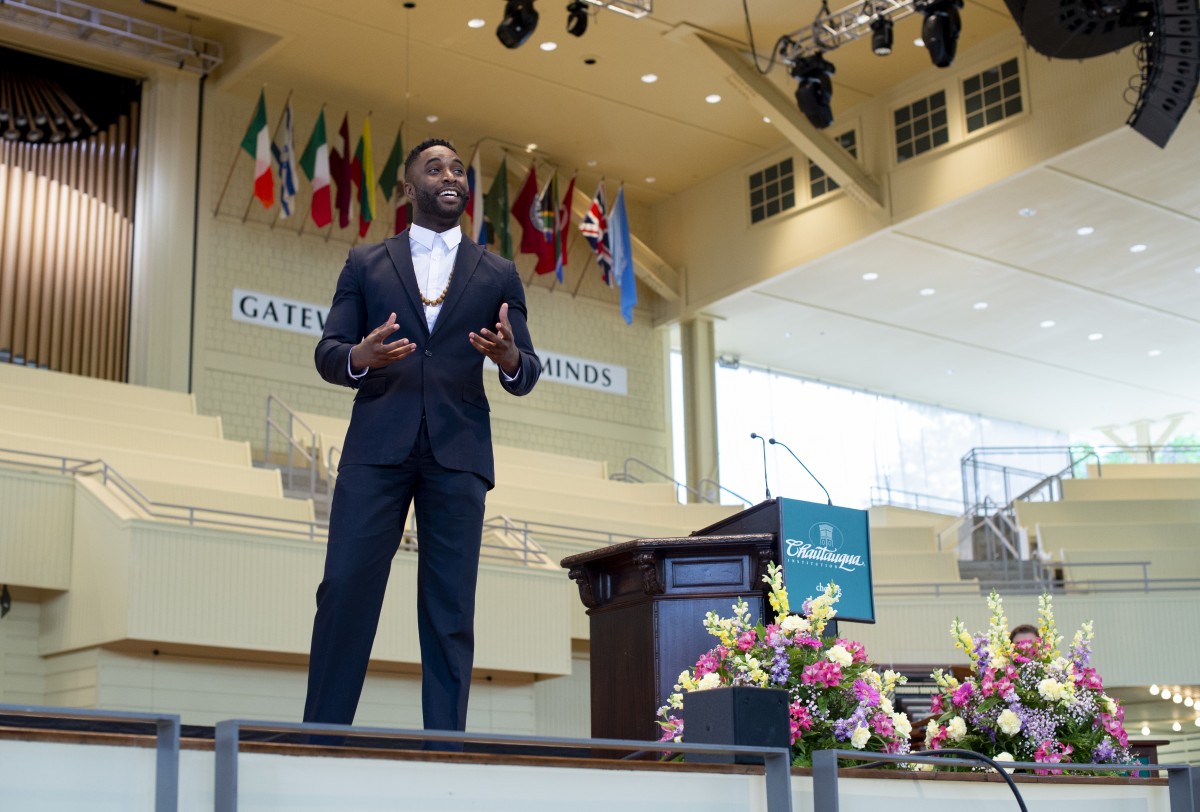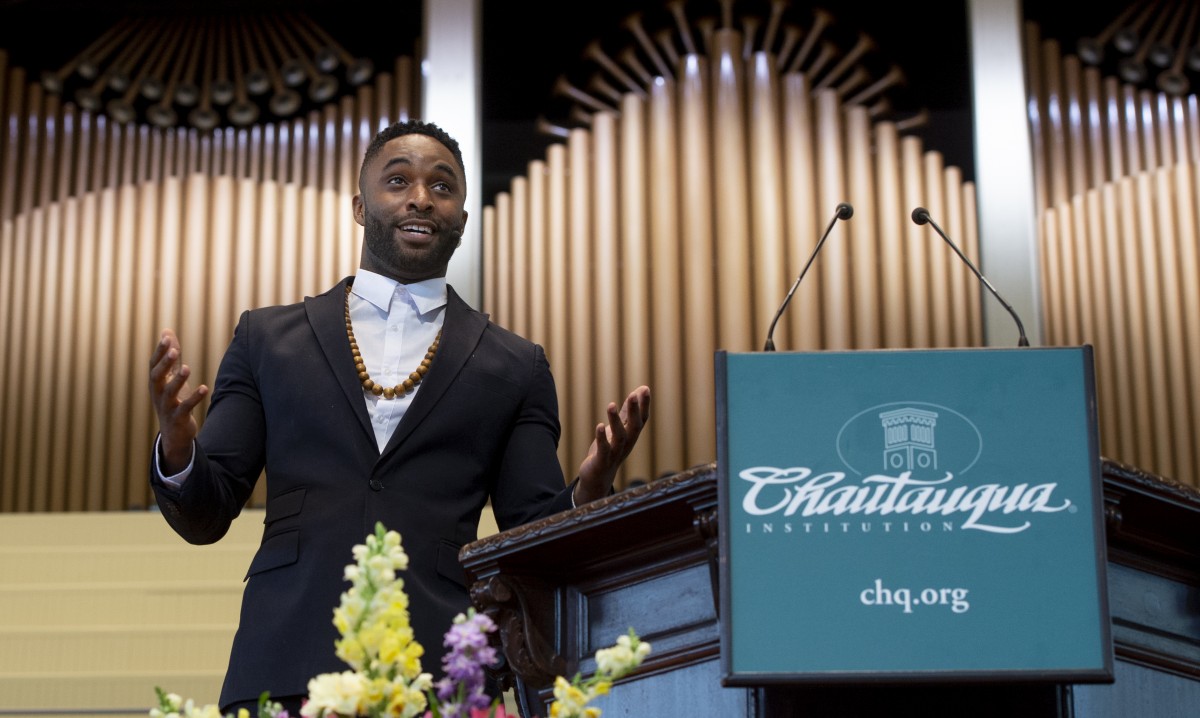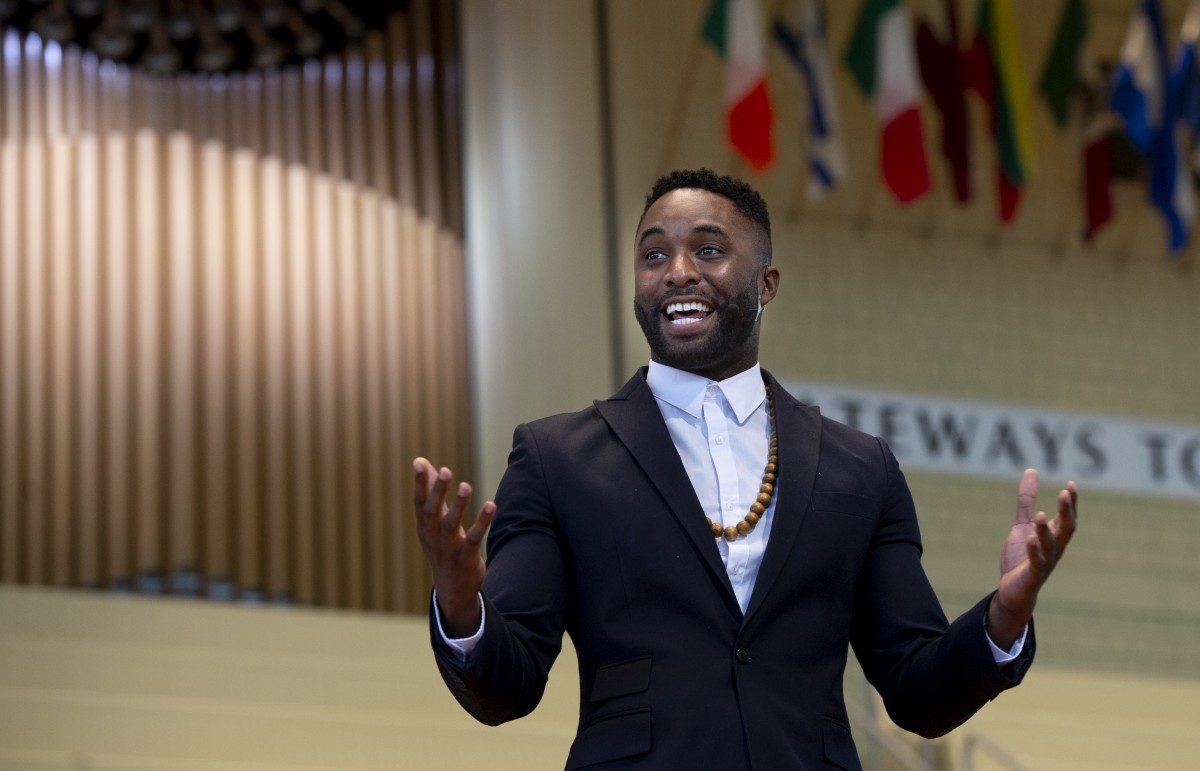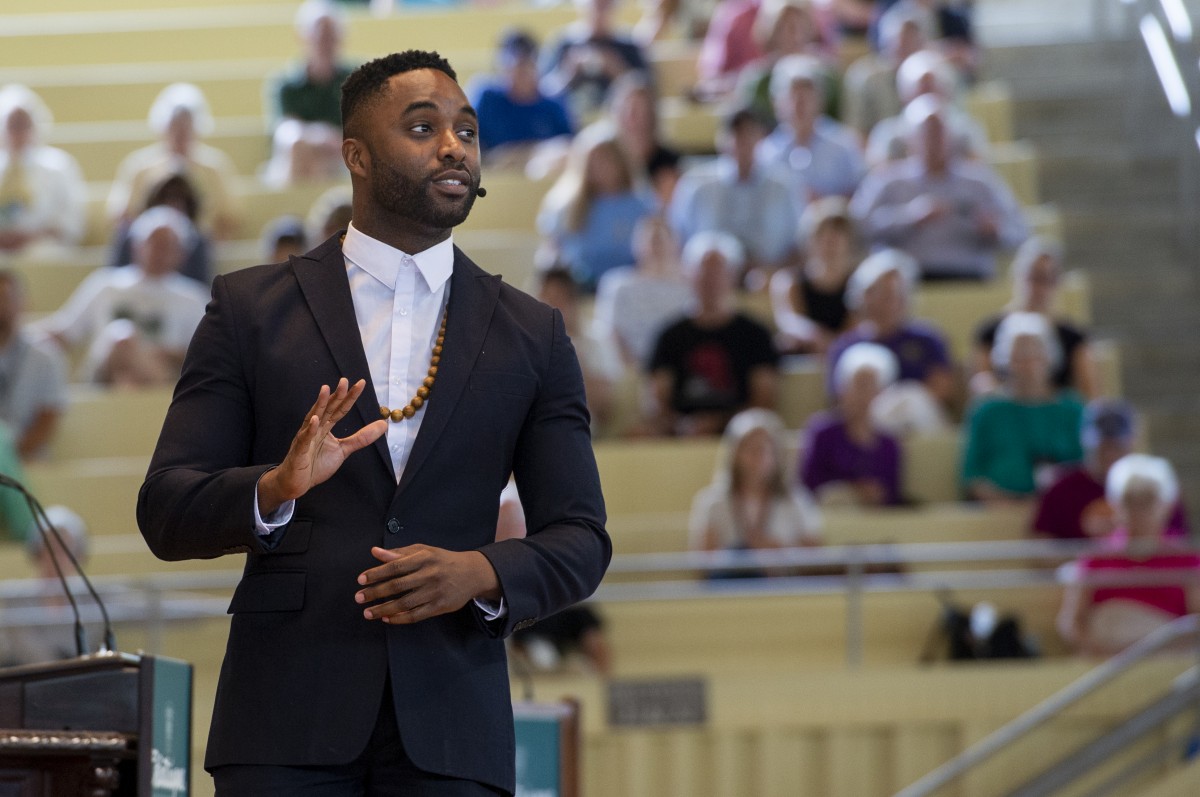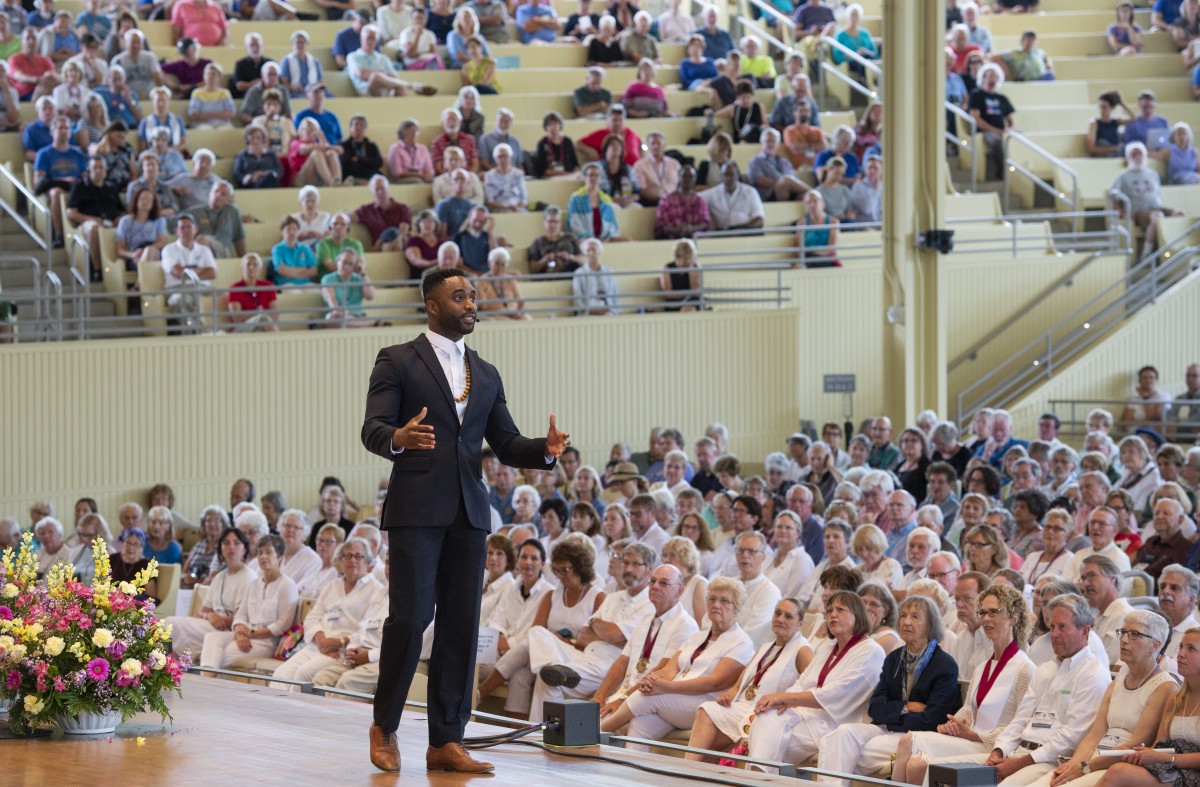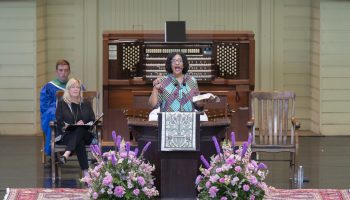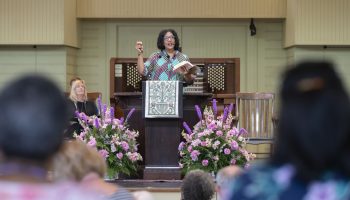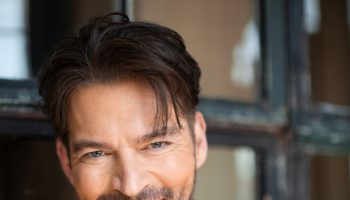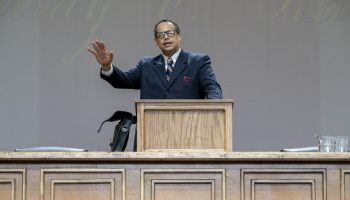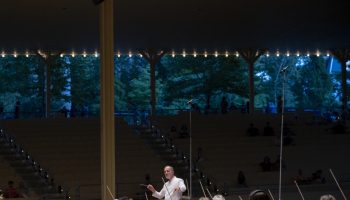Tayo Rockson has a message drilled into his head: “The world is bigger than you, and if you want to succeed in it, you have to understand it.”
He shared this mantra with Wednesday’s 10:45 a.m. morning lecture attendees in the Amphitheater on Aug. 8, speaking to communicating across cultures, a continuation of Week Seven’s theme, “The Arts and Global Understanding.” The morning kicked off with a celebration of the Chautauqua Literary and Scientific Circle Class of 2018, which graduated earlier that day.
“If you look around the world today, we can see that due to the internet and migration patterns, we’re experiencing a whole new world. The intersections of worldviews, ideas, cultures, religions, is influencing every single policy we have today. … So, it’s imperative for leaders of today and tomorrow to learn how to navigate across these differences. It’s no longer just an option to ignore them.”
-Tayo Rockson, CEO, UYD Management
A son of a diplomat, Rockson was raised in Nigeria, Sweden, Burkina Faso, Vietnam and the United States, where he now resides. Rockson serves as the chief executive officer of UYD Management, a consulting and leadership firm that helps companies incorporate diversity, inclusion, hiring, retention and social justice strategies. He is also the host of “As Told by Nomads,” the No. 1 cross-cultural podcast in the world.
Rockson was named one of the Top 40 Millennial Influencers to Follow in 2018 by New Theory magazine and is the author of The Ultimate Guide to TCK Living: Understanding the World Around You.
He opened his lecture with a question for the audience: how many people have had a “nagging thought?” For Rockson, his is how to efficiently execute cross-cultural engagement. As a child, his method was through basketball.
“I had a Taiwanese teammate, a Dutch teammate, a Cameroonian teammate, an American teammate, and I’m Nigerian,” he said. “We had a common goal that was to win. That was my first clue, a common goal. Establishing mutual purpose is so key when you want learn how to communicate effectively across cultures.”
Thus began his quest to connect across borders, a question to resolve his nagging question. The answer: To effectively engage cross-culturally, one must educate — not perpetuate — and communicate. Education begins with the education of ourselves.
Rockson asked the audience to think about three questions — “What have my experiences been?,” “What prejudices do I hold?” and “How much have I strayed outside of my comfort zone?” To answer, he asked the audience to jot down three places they lived, their three best friends and their last three partners, followed by descriptors. Rockson then asked for volunteers to share their responses.
Chautauquan Joann Rose offered to share. A Philadelphia native, Rose moved to a small town and has since relocated to a suburb. One of her best friends was born in Puerto Rico; the other two are her husband and grandchild.
“You can really get isolated in your environment, but over the years if you move and you change, you expand, hopefully,” she said, when asked by Rockson what this information said about herself. “There’s always room for expansion.”
Based on these answers, Rockson asked the audience to examine their biases — are they rooted in fear, insecurity or avoidance?
To overcome these prejudices, Rockson said, people must educate themselves about their environment by learning to collect and gather information, becoming an active listener and being an active member of their community.
“Something amazing happens when you commit to active listening,” he said. “Because actively listening is listening to learn, listening to understand and listening to evaluate. … It is not listening to confirm, which is what a lot of us do.”
Listening to confirm only perpetuates stereotypes and prejudices, Rockson said. He experienced this firsthand when he moved to the United States and a man, after learning he was Nigerian, approached Rockson pretending to hold an imaginary object, which he raised after singing “Circle of Life” from “The Lion King.”
Misguided questions about his culture led Rockson to realize that people trivialize others’ identities through jokes and that marginalized groups feel the need to hide to avoid this humiliation. He said it’s too easy for people to brush others aside as being “too sensitive,” something the media perpetuates through misrepresentation and lack of diversity.
“If we don’t do a better job of creating these stories that are accurate, inviting more people to create these stories through the media,” Rockson said, “… if we don’t do a better job of just clicking send or reshare based on a headline without actually reading, we are going to create this system where no one is listening and we are going to perpetuate certain stereotypes. … Once you perpetuate, you create systems of discrimination, intentionally or unintentionally.”
Communication is key to eroding stereotypes, he said. Rockson quoted Martin Luther King Jr.: “Our lives begin to end the day we become silent about things that matter.”
Rockson offered self-directed questions as a guide for contentious conversations: “What is my goal for this conversation?,” “What do want from this person out of this conversation?,” “What do I want for myself out of this conversation?” and “What do I want from the relationship moving forward?” After examining these motives, Rockson offered a final question — “How will I act if that’s what I want?”
Communication is rooted in abandoning egos and the need to be right in order to find common ground, Rockson said.
“My call to action to you all today is this: educate, don’t perpetuate, instead, communicate,” he said. “Fact of the matter is, you all have a choice; you can choose to see the world as is and do nothing about it, or you can choose to see a world that is hurting and participate by changing the narrative. Whichever choice you make, you’re changing the world in some shape or form. My choice is that you choose the latter, so I leave you with this question: Will you use your difference to make a difference?”
After the conclusion of Rockson’s lecture, Institution Chief of Staff Matt Ewalt opened the Q-and-A by asking if “exposing ourselves to other cultures at times limits ourselves from thinking of cross-cultural understanding within our own community.”
“I don’t think it’s mutually exclusive,” Rockson said, “that if you educate yourself on another person or another culture, you’re going to lose that aspect of yourself.”
Ewalt then turned to the audience for questions; two attendees asked how to find spaces to communicate across cultures.
“If you share your story and create spaces for others to tell their stories, you don’t know what the ripple effect of that is,” Rockson said. “But one thing that won’t allow growth is not doing anything. The very least that anyone can do is tell their story.”

